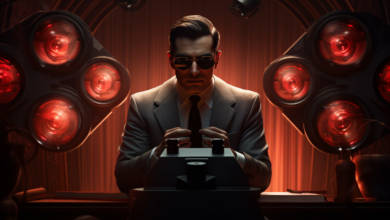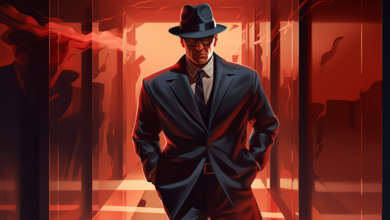
Top Secret Agent Organizations – Discover the World of Espionage
What is a Secret Agent Organization?
A secret agent organization, also known as an intelligence agency, is a secretive governmental or non-governmental organization that operates covertly to collect intelligence, protect national security interests, and carry out clandestine operations. These organizations play a vital role in gathering information, analyzing threats, and providing support to governments in various matters of national importance.
Understanding the terminology:
The formal definition of a Secret Agent Organization:
A secret agent organization can be defined as a specialized government agency or a non-governmental organization entrusted with the responsibility of gathering intelligence and conducting clandestine operations to protect national security interests. These organizations operate undercover, often utilizing covert techniques and advanced technologies to carry out their missions.
The working structure of a secret agent organization:
A secret agent organization typically consists of various departments, each with specific roles and responsibilities. These departments work together to ensure the smooth functioning of the organization and the accomplishment of its objectives. Some key departments include top management, field agents, analysts, support and logistics, specialists and technicians, and internal oversight control.
The key objectives of a Secret Agent Organization:
The primary objectives of a secret agent organization include collecting and analyzing intelligence, conducting covert operations to protect national security interests, providing support to government agencies, and preventing threats to national security. These organizations play a crucial role in monitoring international events, identifying potential threats, and providing actionable intelligence to decision-makers.
The simplest definition of a Secret Agent Organization:
In simple terms, a secret agent organization can be described as a highly specialized and secretive group of professionals who work behind the scenes to gather intelligence, carry out covert operations, and protect national security interests.
Importance Roles of Secret Agent Organizations
Secret agent organizations play a crucial role in both national and international security. They are responsible for gathering intelligence, conducting espionage activities, and protecting the interests of their respective nations. These organizations provide valuable information to decision-makers, enabling them to make informed decisions in matters of national importance.
Some of the key roles of secret agent organizations include:
- Gathering Intelligence: Secret agent organizations collect information from various sources, including human intelligence (HUMINT), signals intelligence (SIGINT), imagery intelligence (IMINT), and open-source intelligence (OSINT). This intelligence helps in understanding the intentions and capabilities of foreign entities, identifying potential threats, and formulating strategies to counter them.
- Conducting Covert Operations: Secret agent organizations carry out covert operations to protect national security interests. These operations may include sabotage, espionage, surveillance, counterintelligence, and counterterrorism activities. Covert operations are essential in preventing and countering threats to national security.
- Counterintelligence: Secret agent organizations are responsible for detecting and countering the efforts of foreign intelligence agencies operating within their countries. They employ various techniques to identify and neutralize espionage activities, protect classified information, and safeguard national secrets.
- Providing Support to Government Agencies: Secret agent organizations provide support to various government agencies by sharing intelligence, conducting joint operations, and offering expertise in specialized areas. They work closely with law enforcement agencies, military forces, and diplomatic corps to address issues of national importance.
Types of Secret Agent Organizations
There are several types of secret agent organizations around the world, each with its specific area of focus and jurisdiction. Some of the common types include:
- Central Intelligence Agency (CIA): The CIA is the primary intelligence agency of the United States. It is responsible for gathering intelligence, conducting covert operations, and analyzing national security threats.
- Secret Intelligence Service (MI6): Also known as MI6, this British intelligence agency focuses on gathering intelligence from foreign sources, counterterrorism, and providing support to the UK government.
- Federal Security Service (FSB): The FSB is the principal security agency of Russia and is responsible for intelligence, counterintelligence, and counterterrorism operations.
- Mossad: Mossad is the national intelligence agency of Israel, specializing in intelligence gathering, covert operations, and counterterrorism activities.
These are just a few examples, and numerous secret agent organizations exist globally, each serving its respective nation’s interests.
How do Secret Agent Organizations Operate?
Secret agent organizations operate using a combination of intelligence collection methods, covert operations, advanced technology, and human resources. They employ a wide range of techniques and strategies to gather information discreetly, protect national security interests, and ensure the safety of their agents.
Some common methods and tools used by secret agent organizations include:
- Covert Surveillance: Secret agents conduct surveillance on individuals, organizations, and nations of interest to gather valuable intelligence. This may involve physical surveillance, electronic monitoring, or the use of drones and other advanced technologies.
- Infiltration: Agents are trained to infiltrate foreign organizations, governments, or criminal networks to gather confidential information or disrupt their operations.
- Cryptography and Code-breaking: Secret agent organizations employ experts in cryptography and code-breaking to decrypt intercepted messages, uncover hidden information, and gain valuable insights.
- Cyber Espionage: In today’s digital age, secret agent organizations invest heavily in cyber espionage capabilities. They employ skilled hackers to penetrate computer networks, gather intelligence, and disrupt cyber operations of foreign entities.
- Covert Operations: Secret agent organizations carry out covert operations to protect national security interests. These operations may include sabotage, assassinations, unconventional warfare, and propaganda campaigns.
Key Secret Agent Organizations across the world
Secret agent organizations exist in almost every nation around the world. Some well-known secret agent organizations include:
| Organization | Country |
|---|---|
| Central Intelligence Agency | United States |
| Secret Intelligence Service | United Kingdom |
| Mossad | Israel |
| Federal Security Service | Russia |
| Australian Secret Intelligence Service | Australia |
| Research and Analysis Wing | India |
These organizations operate with varying degrees of secrecy and jurisdiction, and their structures and operations can differ significantly based on their respective national contexts.
Exploring the hierarchy inside a Secret Agent Organization
A secret agent organization typically has a hierarchical structure that enables effective coordination, communication, and decision-making.
The hierarchy consists of various levels, each with its specific roles and responsibilities. Let’s delve into some of the key positions within a secret agent organization and their functions:
1. Top Management
The top management of a secret agent organization comprises senior officials responsible for strategic planning, policy formulation, and overall organization management. This includes directors, deputy directors, and other high-ranking positions. Their primary functions include:
- Setting objectives and strategic goals for the organization
- Formulating policies and guidelines for intelligence gathering and covert operations
- Overseeing the day-to-day operations and ensuring compliance with legal and ethical standards
- Making critical decisions regarding the allocation of resources and prioritization of missions
The function and role of top management in secret agent organizations are crucial in shaping the organization’s vision, mission, and overall effectiveness.
2. Field Agents
Field agents are on the front lines of secret agent operations. They are tasked with gathering intelligence, conducting surveillance, and carrying out covert operations. Some key aspects of their role include:
- Infiltrating targeted organizations or regions to gather sensitive information
- Conducting surveillance of individuals or organizations of interest
- Executing covert operations such as sabotage, espionage, and intelligence collection
- Maintaining contacts with informants and sources to gather valuable intelligence
Being a field agent comes with significant risks and rewards. It requires exceptional skills, adaptability, and the ability to work under high-pressure situations while remaining undetected.
3. Analysts
Analysts within a secret agent organization are responsible for analyzing gathered intelligence, assessing potential threats, and providing actionable insights to decision-makers. Their key responsibilities include:
- Examining collected information and identifying patterns, trends, and potential risks
- Assessing the credibility and reliability of sources
- Conducting in-depth research on specific topics or entities
- Collaborating with field agents and other departments to validate and analyze intelligence data
Analysts play a critical role in converting raw data into valuable intelligence, enabling informed decision-making within the organization.
4. Support and Logistics
The support and logistics team ensures the smooth functioning of secret agent operations by providing essential resources, infrastructure, and administrative support. Some of their responsibilities include:
- Managing the organization’s assets, equipment, and resources
- Coordinating logistics for field operations, including transportation, accommodation, and supplies
- Providing administrative support for personnel, including travel arrangements, procurement, and budgeting
- Maintaining communication networks and secure channels for information exchange
The support and logistics team’s efficiency is crucial in ensuring seamless operations and minimizing risks during covert missions.
5. Specialists and Technicians
Technology plays a significant role in modern secret agent operations, and organizations have dedicated teams of specialists and technicians responsible for developing and maintaining advanced tools and systems. Their roles include:
- Developing and maintaining secure communication systems
- Conducting research and development of advanced surveillance technologies
- Providing technical expertise for cyber operations and digital intelligence gathering
- Ensuring the security of the organization’s information systems and networks
Specialists and technicians are essential in leveraging technology to enhance the organization’s capabilities and stay ahead in the world of espionage.
6. Internal Oversight Control
To maintain quality, legality, and ethical standards, secret agent organizations have internal oversight and control mechanisms. Their responsibilities include:
- Conducting internal audits to ensure compliance with legal and ethical standards
- Monitoring the organization’s activities for potential misconduct or security breaches
- Assessing the effectiveness of intelligence collection, covert operations, and information security practices
- Implementing safeguards to protect classified information and prevent leaks
Internal oversight control ensures the integrity of secret agent organizations and the accountability of its agents.
How to Become a Secret Agent: Myths and Realities
The glamorous portrayal of secret agents in movies and pop culture often creates myths and misconceptions about what it takes to become one. In reality, the path to becoming a secret agent is quite challenging and demanding. Let’s address some of the common myths and realities associated with becoming a secret agent:
7. Education Training
Myth: One needs to have a specific educational background to become a secret agent, such as a degree in espionage or criminal justice.
Reality: While having a relevant educational background can be advantageous, secret agent organizations value diverse skill sets. Degrees in fields such as international relations, languages, computer science, or law enforcement can be beneficial. Additionally, specialized training programs are provided to enhance skills necessary for secret agent operations.
8. Physical and Psychological Aspects
Myth: Secret agents must be physically fit, highly trained, and possess exceptional combat skills.
Reality: Physical fitness is essential for secret agents as they may encounter challenging situations; however, specific combat skills are not mandatory for all roles. Psychological resilience, critical thinking abilities, adaptability, and resourcefulness are equally crucial traits for secret agents.
9. Legal and Ethical Considerations
Myth: Secret agents operate outside the boundaries of the law and ethics.
Reality: Secret agent organizations operate within legal frameworks and adhere to strict ethical guidelines. Agents are required to follow local and international laws, respect human rights, and uphold their organization’s code of conduct.
10. Risks and Challenges
Myth: Being a secret agent is all about glamorous missions, high-profile targets, and thrilling adventures.
Reality: Secret agent operations are often associated with significant risks, such as physical danger, exposure to life-threatening situations, and psychological stress. Agents must be prepared to make sacrifices, work in secrecy, and handle sensitive situations with utmost discretion.
Roles of Secret Agent Organizations in World Affairs
Secret agent organizations play vital roles in shaping world affairs. They contribute to the security and stability of nations by providing valuable intelligence and executing covert operations. Some key roles secret agent organizations assume in world affairs include:
- Advancing National Security Interests: Secret agent organizations safeguard the national security interests of their respective nations by monitoring global events, identifying emerging threats, and providing early warnings. They play a crucial role in countering terrorism, preventing organized crime, and combating espionage.
- Supporting Diplomacy: Secret agent organizations provide intelligence support to diplomatic initiatives by gathering information on foreign entities, assessing their intentions, and facilitating informed decision-making. They play a vital role in negotiations, peacekeeping missions, and international collaborations.
- Countering Foreign Influence: Secret agent organizations are responsible for detecting and countering foreign intelligence activities within their countries. They protect against espionage, sabotage, cyber threats, and foreign interference in domestic affairs.
- Counterterrorism Operations: Secret agent organizations play a significant role in countering international terrorism. They gather intelligence, track terrorists, disrupt their operations, and collaborate with international partners to combat terrorism globally.
Secret agent organizations act as crucial pillars in maintaining global stability, safeguarding national interests, and countering imminent threats to peace and security.
Secrets of Success: How the Best Organizations Stay Ahead
Successful secret agent organizations demonstrate certain key factors that contribute to their effectiveness and excellence. These organizations understand the changing dynamics of the world, adapt to emerging technologies, and embrace innovation. Some secrets to their success include:
- Proactive Intelligence Gathering: The best secret agent organizations anticipate threats and actively gather intelligence on potential risks. They invest in advanced technologies, cultivate human intelligence networks, and collaborate with international partners to stay ahead.
- Strong Leadership: Successful secret agent organizations have leaders who possess deep knowledge of security matters, strategic vision, and the ability to make sound decisions amidst complex scenarios. They foster a culture of excellence, encourage teamwork, and inspire their teams with a clear sense of purpose.
- Continuous Training and Professional Development: The best organizations prioritize continuous training for their agents to enhance their skills, adaptability, and resilience. They provide specialized courses, workshops, and simulations to prepare agents for real-world challenges.
- Collaboration and Information Sharing: Successful secret agent organizations understand the importance of collaboration. They establish strong partnerships with international agencies, share intelligence, and create joint task forces to tackle transnational threats effectively.
- Embracing Technology: The best organizations leverage technology advancements to gather intelligence, analyze vast amounts of data, encrypt communication channels, and detect cyber threats. They invest in cutting-edge surveillance and encryption technologies, ensuring their agents have the necessary tools to carry out operations seamlessly.
- Effective Oversight and Accountability: Successful secret agent organizations prioritize internal oversight, control mechanisms, and accountability frameworks to ensure the legality, ethics, and quality of their operations. They establish proper channels for reporting misconduct and security breaches and regularly review their practices for continuous improvement.
Wrapping Up: Dispelling Myths and Understanding the Reality
Secret agent organizations play a crucial role in gathering intelligence, protecting national security interests, and executing covert operations. It is essential to understand the reality behind these organizations, dispel the myths propagated by pop culture, and appreciate the complexity of their operations.
From their working structure, roles, and hierarchy to the challenges faced by secret agents and the significance of these organizations in world affairs, this article has provided a comprehensive glimpse into the world of secret agent organizations.
Next time you watch a spy movie or read a thrilling espionage novel, remember that the reality of secret agent organizations is far more intricate and essential in shaping the world we live in.
Secret Agent Organizations and Pop Culture: Reflecting the Real World?
Secret agent organizations have always captured the imagination of people, serving as a rich source of inspiration for pop culture. Movies, TV shows, and novels often depict secret agents engaged in thrilling adventures, using high-tech gadgets, and outsmarting enemies. While such depictions may contain elements of reality, they tend to exaggerate certain aspects for entertainment purposes.
Pop culture representations of secret agent organizations often romanticize their work, focus on individual heroics, and simplify the complexities of intelligence gathering operations. Although these portrayals may not reflect the real-world operations of secret agent organizations accurately, they continue to captivate audiences and contribute to the cultural fascination with spies and espionage.
However, it is important to differentiate between cinematic portrayals and the reality of secret agent organizations. The work carried out by these organizations is serious, complex, and involves significant risks. Real-world secret agents do not possess superhuman abilities, nor do they operate with limitless resources and extravagant budgets.
While pop culture may inspire interest in the world of secret agent organizations, it is crucial to approach these depictions with critical thinking and an understanding of the real complexities and challenges faced by the men and women who work tirelessly to safeguard national security interests.

















